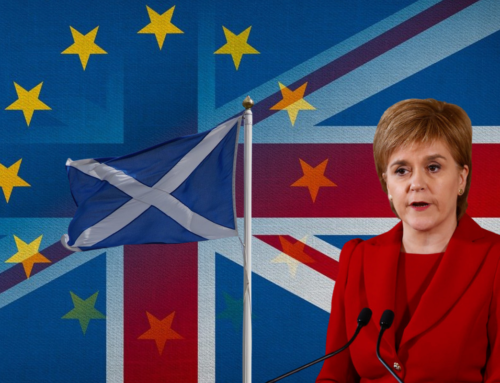
by Brendan Donnelly
Director, The Federal Trust
17th December 2019
Click here to read a response to this blog by Professor Graham Room, and Brendan’s reply.
For the outcome of last week’s General Election to have any chance of postponing or even preventing Brexit, four related pieces of the electoral jigsaw needed to fall into place. The Labour Party needed to do as well in votes and seats as in 2017; the Liberal Democrats had to gain more seats than in 2017; Tory Remainers needed to abandon the Conservative Party in large numbers; and tactical voting against the Conservatives had to take place on a substantial scale. Neither of the first two happened and the latter two did not happen on anything like the required extent. It is now therefore inevitable that the United Kingdom will leave the European Union on 31st January 2020.
Jeremy and Jo
Few commentators have been in any doubt that Jeremy Corbyn’s leadership played a central role in the electoral calamity suffered by Labour on 12th December. Even among traditional Labour voters, he was widely regarded as an implausible Prime Minister, seen as divisive and ideologically intolerant within and towards his own Party. His evasive and ambiguous approach to Brexit during the General Election was probably unavoidable given the dilemma with which he and his Party had been wrestling since 2016; a Party whose voters and members were overwhelmingly hostile to Brexit but whose leader saw definite merit in Brexit, as long as it took place under a Corbynite government. As a result of this dissonance, Labour policy towards Brexit since 2016 had always been characterised by fitful incoherence. If Corbyn had spent the past three years explaining to the voters of Bolsover why Brexit would harm their economic interests, Dennis Skinner might well still be a Member of Parliament. Instead, Labour lost votes to parties both more and less favourable to Brexit than itself. Corbyn’s inability or refusal to support either side in any forthcoming EU referendum may stand as a fitting symbol for his feckless and self-defeating Labour leadership.
Much criticism has rightly been directed towards the former Leader of the Liberal Democrats Jo Swinson for her original decision to support a General Election and her conduct of her party’s campaign. It would certainly have been wiser had she had supported a longer and more sustained attempt to scrutinise and harry the parliamentary passage of the Withdrawal Agreement negotiated by Boris Johnson, maintaining in reserve the possibility of provoking an election. A minority government attempting to defend against detailed scrutiny a controversial Withdrawal Agreement should have offered a tempting target over many weeks in November and December for forensic dissection by the Opposition. The misleading slogan “Get Brexit Done” could not possibly have survived such dissection. Any later General Election would then have been held in much more favourable circumstances for the Liberal Democrats and the Remain cause. Swinson compounded her original strategic error by poor campaigning, which originally saw her putting herself forward as a candidate for Prime Minister who was every bit as implausible as Jeremy Corbyn. In the same way as Corbyn alienated both Remainers and Leavers, Swinson alienated potential voters from the left by her polemical tone towards Labour and enthusiasm for nuclear weapons while electors from the right feared that a vote for the Liberal Democrats would end up propelling Corbyn into Downing Street.
Undoubtedly, some Conservative Remainers voted for the Liberal Democrats in 2019. It cannot be excluded that some were attracted by the controversial original commitment of the Liberal Democrats to revoke the Article 50 notification without a referendum. But a particular success of the Conservative campaign was to limit the haemorrhaging of Remainer votes away from Johnson. Johnson was certainly helped by fear and distrust of Corbyn among traditional Conservative voters, even Remainers. Just as important, however, for Johnson’s victory was the incapacity of the influential minority of prominent anti-Brexit Conservatives to act in any politically coherent or effective fashion during the election. Of the 21 Conservative MPs expelled from the Parliamentary Party in September, some retired, some eventually returned to the ranks, some joined the Liberal Democrats and some stood unsuccessfully as Independent Conservatives. In their long march through the institutions of the Conservative Party, radical Eurosceptics have always been able to count on divisions and uncertainty within the party’s pro-European ranks. In December 2019 the history of pro-European Conservatism correspondingly died not with a bang but a whimper. Expressions during the electoral period of distaste and disquiet from pro-European luminaries such as Major, Heseltine, Patton and Clarke were much too little, and much too late. Their complacency and inactivity over many years were rewarded with contemptuous rejection on 12th December.
Tactical voting chimera
Much hope was invested by Remain campaigners in the prospect of widespread tactical voting in the General Election to maximise Parliamentary seats won by anti-Brexit candidates. The Liberal Democrats, for whom the votes cast rose significantly from a low base, may well have benefitted from this phenomenon. But their failure to translate these extra votes into extra seats is the absolute demonstration of the failure of the tactical voting campaign. Fear of Corbyn, traditional party loyalties, low interest in the European issue from many voters will all have played a part in this failure. But there was a further, underlying issue, well exemplified by the breath-taking civil war that racked the People’s Vote campaign in late October, shortly after the successful “People’s March” of 19th October in support of a second referendum. At the heart of this civil war was the unresolved issue of whether the PV campaign should be an unabashedly pro-EU campaigning organisation or one concentrating its attention predominantly on securing a second EU referendum. This long-running internal quarrel had until then largely been resolved in favour of the second approach, much to the frustration of many grass-roots campaigners who wished to see the pro-European case more energetically presented. These grass-root campaigners will regard their concerns as having been vindicated by the General Election result. Not enough had been done by December 2019 to give the voters reasons why they should vote tactically against Brexit. Numerous websites informing them how they should vote tactically against Brexit were only of interest to the already converted. It turned out there were not yet enough of them to prevent a significant Conservative victory – and, tellingly, they often and critically disagreed among themselves about which candidate, Liberal Democrat or Labour (see Kensington) to support.
What next?
Although some were more predictable than others, none of the above outcomes was inevitable. It was reasonable for Remainers to work and hope for the political cards to fall to their advantage. The now inevitable British withdrawal from the EU in early 2020 creates, however, a new situation in which those who sought to prevent Brexit will need to choose between accommodation and resistance. Those pro-accommodation will be eager to advocate a relatively “soft” Brexit and the (optimistic) hope has already been expressed that Johnson will use his large majority to veer in that direction. Those who prefer resistance will be loud in denouncing the inevitably tortured progress of the Brexit negotiations in 2020 and succeeding years. They will have no interest in attempting to adjudicate between the competing factions of the Conservative Party as it wrestles with the unsolved and insoluble dilemmas of Brexit. They will be conscious that maintaining public belief in an eventual reversal of Brexit is a necessary, even if insufficient condition for this reversal to happen eventually.
It will be clear from the above that intra-party and inter-party politicking have hobbled and inhibited any popular campaign against Brexit. Both Labour and Conservative pro-Europeans have preferred to put the unity of their parties above the pro-European cause in their political priorities. The Liberal Democrats have found themselves scavenging for political advantage from the divisions of the two main parties. The SNP have ruthlessly exploited Brexit as a crowbar to advance their Parliamentary representation and campaign for a second independence referendum. Against this confused background, it is surprising that the pro-European cause has maintained the popular support that it has, with all opinion polls now showing a consistent and clear majority for “Remain.” Such a mismatch between popular sentiment and the positioning of the main political parties on European policy must be unsustainable in the longer term. Either public opinion will drift towards the resignation and indifference on European issues for which Johnson fervently hopes, or there will be a reconfiguration of the British party political landscape, so often predicted and yet always elusive. The identities of the next Labour and Liberal Democrat leaders will be crucial in this regard. Keir Starmer and Ed Davey would find little difficulty in establishing close relations between their parties in an anti-Brexit bloc. A Corbynite Labour leader would make close relations much more difficult, whoever leads the Liberal Democrats. But by the strange and contorted logic of British politics the latter might well be substantial beneficiaries if Labour sticks to the Corbynite experiment.
It ain’t over…
In a post-election interview, Lord Heseltine proclaimed the Remain battle definitively lost and asserted it would be twenty years before the UK rejoined the EU. Such pessimism is at the very least premature. It is entirely conceivable that an effective Labour leader, working with the SNP and Liberal Democrats, will prove able to expose in coming years the damaging compromises that Johnson will be forced to accept if he is to have any longer-term agreement on trade and security with the EU. Such compromises formed no part of the Brexit prospectus offered the electorate in 2016. Nor is Johnson’s domestic electoral coalition secure. It is much easier to promise lavish investment to the victims of Conservative austerity over the past decade than rapidly to implement such promises in a fiscally sustainable way. Moreover, Johnson has no answer to the pressing constitutional challenges in Scotland and Northern Ireland thrown up by the combination of Brexit and the General Election. Irish unification and Scottish independence are two political aspirations that have been formidably reinforced by events since June 2016.
There is every chance that by the end of 2020 the fraud and fantasy of Brexit have been revealed to the electorate much more clearly even than hitherto. Once the edifice has begun to crumble, the reversal of public opinion could be dramatic. It would be to take Johnson’s propaganda entirely at its own valuation to assume that he and the Brexit project will be in the same rude political health as they are today. Johnson well knows that Brexit cannot in any circumstances be anything remotely approaching an economic success. He believes, however, that he has a reasonable chance of avoiding the worst and blaming the damage Brexit does on foreigners. There is no reason to believe that he is correct in that assessment, and good reason to believe that he is wrong. If Johnson is wrong, all Lord Heseltine’s defeatist predictions will soon come back to haunt him in his beloved arboretum.
Response to this blog by Professor Graham Room, and Brendan’s reply.







[…] written by Professor Graham Room, University of Bath, in response to Brendan Donnelly’s blog Brexit: The end of the beginning. Please see below for Brendan’s […]